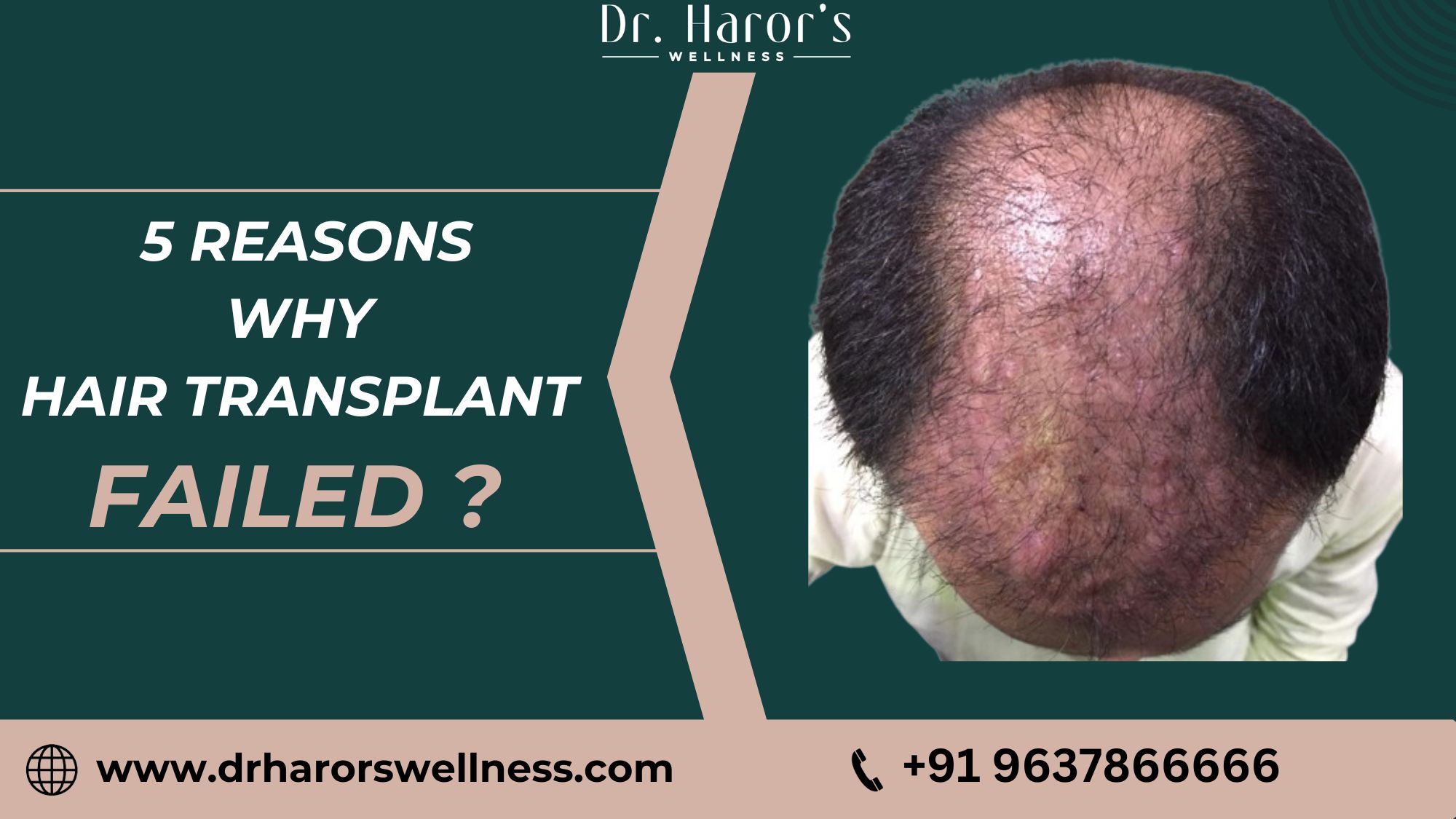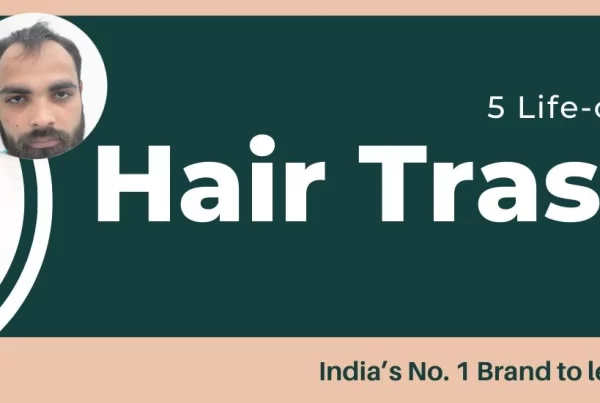
If your search for the best hair transplant in Delhi has resulted in a failed hair transplant, it’s crucial to evaluate what went wrong. Hair transplant is a proven method for treating male pattern baldness, providing a permanent, effective, and safe surgical solution. Advances in hair transplant technology in Delhi have greatly improved, offering nearly predictable and long-lasting results. However, insufficient research or rushed decisions can sometimes lead to a failed hair transplant. Spending your hard-earned money and waiting nearly a year for disappointing results can be more distressing than dealing with natural baldness. It can cause significant embarrassment and a loss of confidence. In this article, we aim to explore the reasons behind why hair transplants fail in certain cases.
What is a failed Hair Transplant?
Hair transplantation is a minimally invasive surgical procedure in which hair follicles are extracted from areas of dense hair growth (donor areas) and transplanted into balding areas of the scalp. Visible results usually begin to appear within 6 months following the procedure. A lack of noticeable improvement after 6-9 months is generally regarded as indicative of a failed hair transplant
If you’re considering a hair transplant but are concerned about potential undesired results, continue reading to learn about the possible reasons for failure and how to prevent a botched procedure.
- Non-specialised Clinic or surgeon: . Hair transplant is such a popular operation, a lot of clinics and surgeons have started offering hair transplant operation. The over-commercialization and lack of regulation in the hair transplant industry have also led to the entry of low-cost providers, sometimes resulting in failed hair transplants.
A non-specialist may perform the critical steps in wrong way leading to enough hair grafts trauma or transaction rate . Higher transaction rate lead to pressure on donor area and may lead to over harvesting . In addition this proper tool and technique may be missing in graft handling, Failure to minimize the grafts trauma increases the chances of failed or poor hair transplant result..
- Non eligible patient Selection: Not every candidate is suitable for a hair transplant. The success of the procedure depends significantly on your overall health and the specific condition of your hair. Factors such as advanced baldness with a lack of donor hair, scalp diseases like psoriasis, or undiagnosed scarring can contribute to transplant failure. Insufficient hair follicles (‘seeds’) or an inadequate ‘soil’ on the scalp can also lead to unsuccessful transplants
- Post-operative Graft Rejection: Some patients may experience graft rejection following a hair transplant, resulting in unsuccessful outcomes. This rejection can be associated with a condition known as Lichen planopilaris (LLP), a type of primary scarring alopecia. LLP causes inflammation in the upper part of hair follicles, leading to their replacement with scar tissue. While not definitively proven, there are observed connections between hair transplant procedures and the onset of LLP.
- Result expectations are unrealistic: The results of a hair transplant are influenced by inherent factors such as the grade of baldness and the quality and quantity of donor hair. In advanced stages of baldness like Norwood VI-VII, expecting high density and full coverage may be unrealistic. To avoid disappointment with your hair transplant results, it’s crucial to openly communicate your goals and expectations with your surgeon. Your surgeon can provide realistic guidance on what you can achieve through the procedure and can help manage any unrealistic expectations
- Non-compliance with post-operative instructions: After a successful hair transplant, proper aftercare is crucial for achieving the best outcomes. Effective post-transplant care should aim to nurture the newly transplanted hair follicles, facilitate healing in both the donor and recipient areas, and minimize any potential damage to the hair follicles
Health check-list before Hair transplant:
Before undergoing hair transplant surgery, patients should carefully consider the following checklist to ensure the procedure is approached with caution:
- Patients with chronic health conditions such as diabetes, hypertension, or those taking blood thinners should receive thorough evaluation from their physician before proceeding with hair transplant surgery.
- Scalp disorders like seborrheic dermatitis or scalp psoriasis should be addressed and treated in advance.
- Hair transplant is not recommended for individuals with Alopecia Areata.
- Patients prone to keloid formation are advised against undergoing hair transplant surgery.
- Areas of the scalp scarred due to burns or skin diseases may have reduced viability for transplanted hair growth. A test patch is recommended prior to the procedure.
- Patients experiencing very early stages of hair loss, diffuse hair thinning, or female pattern hair loss should undergo detailed consultation with their doctor before deciding on hair transplant surgery.
Dos and Don’ts Before Hair Transplant Surgery
- Do not take a haircut or hair trim before the procedure.
- Minimize consumption of tea, coffee, or caffeine to once or twice a day the day before surgery.
- Avoid alcohol-based beverages, vitamin supplements, and smoking at least 24 hours before and up to one week after the procedure for optimal results.
- Rest and ensure you sleep well both before and after the surgery.
- Shampoo and use antiseptic soap when bathing/showering before arriving for the procedure.
- If applicable, do not shave beard hair 2-3 days before surgery.
- On the day of surgery, avoid wearing T-shirts or sweaters. After the procedure, opt for clothing that does not need to be pulled over your head, such as shirts with buttons or jackets with zips. Refrain from towel drying or using a hair dryer for at least 10 days.
- Continue any medication for hypertension, diabetes, cardiovascular diseases, epilepsy, etc. Take your morning dose of regular medication on the day of surgery.
- Before arriving, have a wholesome breakfast. Juices will be provided at our facility, and snacks are available for a nominal extra cost.
- After surgery, we advise against self-driving. Please arrange for someone to drive you back. Alternatively, we can arrange a cab at actual cost if requested.
- Inform us before the surgery about any drug allergies, medical disorders, medications currently taken, or recent medical procedures within the last 15 day
How Dr Haror’s Wellness minimizes the chances of Failed Hair Transplant
Dr. Haror Wellness Clinic takes a thorough and scientific approach to hair transplants, which is excellent for potential patients looking for transparency and effective results. The Team led by Dr Navnit Haror excels in aligning patient expectations with realistic outcomes based on scientific evaluation is crucial for ensuring satisfaction and minimizing the chances of failed hair transplant. We have corrected hundreds of failed hair transplant with an approach that not only builds trust but also highlights the clinic’s commitment to using the latest techniques and tools to enhance the success of hair transplant procedures. If you have any specific questions about the clinic or their procedures, feel free to ask!
Your hair transplant failed? But don’t fail in giving 2nd chance:
There’s no need to feel despair or hopelessness. After evaluating the donor area and assessing the extent of corrective measures needed, a second attempt to address the failed hair transplant can be carefully planned to address the issue. Both you and your best hair transplant surgeon in Delhi should proceed with caution during the planning phase, as this second procedure could be your final opportunity for correction.
FAQ ( Frequently Asked Question)
- What happens if your hair transplant fails ?
A failed Hair transplant leaves you in a state despair and hopelessness. causing significant embarrassment and loss of confidence. Causing significant embarrassment and loss of confidence .You must nor remain in same state, give a 2nd chance to a repair or corrective hair transplant A repair or corrective hair transplant requires specialized skill often performed by expert hair transplant surgeon.
-
How to identify a failed hair transplant?
A failed hair transplant is characterized by poor aesthetics, low density, unnatural hair direction, and scarring in the recipient area.
3. Why some hair transplant fails ?
Some hair transplants fail due to factors such as poor donor quality and quantity, undiagnosed underlying scalp diseases, inexperienced practitioners, and inadequate post-operative care.
4. Why is hair transplant risky ?
Hair transplants are generally safe when performed by qualified surgeons in sterile clinical environments, following mandatory blood tests. However, risks can arise if the procedure is undertaken without thorough research, leading to treatment at overly commercialized clinics.
5. What is stage 6 hair loss ?
Stage VI baldness typically refers to a very advanced stage of male pattern baldness where the scalp is highly visible due to extensive hair loss on the top and front of the head.





